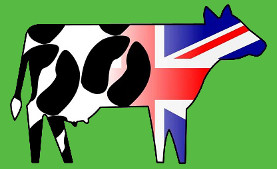By Auzmendi, J. and Corbellini, C. N. and De Mattos, A. C. and Mangoni, A. R. and Mattos, A. C., Revista de Medicina Veterinaria Buenos Aires, 1997
Description
A total of 155 first-calving heifers from a herd with 23-30 ppm Zn in the diet (dry matter basis) were used. 51 were controls; 52 were given 3 g/day ZnO2 (71% Zn) from 30 days before parturition to the end of lactation; the remaining 52 cows were given 2 g/day of methionine-Zn (21.2% Zn). The calculated daily Zn intakes in the 3 groups were 440.24, 2570.24 and 864.24 mg/cow respectively. Milk production was 5.4% higher in cows given methionine-Zn compared to controls; ZnO2 supplementation had no significant effect. Zn supplementation, especially as methionine-Zn significantly reduced the prevalence of dystocia and endometritis, decreased the parturition-conception interval and reduced the somatic cell count. Methionine-Zn supplementation significantly reduced the prevalence of post-partum lameness. Zn concentration in milk was significantly higher in methionine-Zn supplemented cows at 180 days after parturition (6.32 mg/litre compared to 4.67 mg/litre in controls). The advantages of the use of Zn supplements and the physiological basis for the differences between response to the 2 types of supplement are discussed
A total of 155 first-calving heifers from a herd with 23-30 ppm Zn in the diet (dry matter basis) were used. 51 were controls; 52 were given 3 g/day ZnO2 (71% Zn) from 30 days before parturition to the end of lactation; the remaining 52 cows were given 2 g/day of methionine-Zn (21.2% Zn). The calculated daily Zn intakes in the 3 groups were 440.24, 2570.24 and 864.24 mg/cow respectively. Milk production was 5.4% higher in cows given methionine-Zn compared to controls; ZnO2 supplementation had no significant effect. Zn supplementation, especially as methionine-Zn significantly reduced the prevalence of dystocia and endometritis, decreased the parturition-conception interval and reduced the somatic cell count. Methionine-Zn supplementation significantly reduced the prevalence of post-partum lameness. Zn concentration in milk was significantly higher in methionine-Zn supplemented cows at 180 days after parturition (6.32 mg/litre compared to 4.67 mg/litre in controls). The advantages of the use of Zn supplements and the physiological basis for the differences between response to the 2 types of supplement are discussed
We welcome and encourage discussion of our linked research papers. Registered users can post their comments here. New users' comments are moderated, so please allow a while for them to be published.
